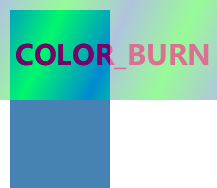java.lang.Object
javafx.scene.effect.Effect
javafx.scene.effect.Blend
public class Blend extends Effect
An effect that blends the two inputs together using one of the
pre-defined
BlendModes.
Example:
Blend blend = new Blend();
blend.setMode(BlendMode.COLOR_BURN);
ColorInput colorInput = new ColorInput();
colorInput.setPaint(Color.STEELBLUE);
colorInput.setX(10);
colorInput.setY(10);
colorInput.setWidth(100);
colorInput.setHeight(180);
blend.setTopInput(colorInput);
Rectangle rect = new Rectangle();
rect.setWidth(220);
rect.setHeight(100);
Stop[] stops = new Stop[]{new Stop(0, Color.LIGHTSTEELBLUE), new Stop(1, Color.PALEGREEN)};
LinearGradient lg = new LinearGradient(0, 0, 0.25, 0.25, true, CycleMethod.REFLECT, stops);
rect.setFill(lg);
Text text = new Text();
text.setX(15);
text.setY(65);
text.setFill(Color.PALEVIOLETRED);
text.setText("COLOR_BURN");
text.setFont(Font.font(null, FontWeight.BOLD, 30));
Group g = new Group();
g.setEffect(blend);
g.getChildren().addAll(rect, text);
The code above produces the following:

- Since:
- JavaFX 2.0
-
Property Summary
Properties Type Property Description ObjectProperty<Effect>bottomInputThe bottom input for thisBlendoperation.ObjectProperty<BlendMode>modeTheBlendModeused to blend the two inputs together.DoublePropertyopacityThe opacity value, which is modulated with the top input prior to blending.ObjectProperty<Effect>topInputThe top input for thisBlendoperation. -
Constructor Summary
Constructors Constructor Description Blend()Creates a new instance of Blend with default parameters.Blend(BlendMode mode)Creates a new instance of Blend with the specified mode.Blend(BlendMode mode, Effect bottomInput, Effect topInput)Creates a new instance of Blend with the specified mode and bottom and top inputs. -
Method Summary
Modifier and Type Method Description ObjectProperty<Effect>bottomInputProperty()The bottom input for thisBlendoperation.EffectgetBottomInput()Gets the value of the property bottomInput.BlendModegetMode()Gets the value of the property mode.doublegetOpacity()Gets the value of the property opacity.EffectgetTopInput()Gets the value of the property topInput.ObjectProperty<BlendMode>modeProperty()TheBlendModeused to blend the two inputs together.DoublePropertyopacityProperty()The opacity value, which is modulated with the top input prior to blending.voidsetBottomInput(Effect value)Sets the value of the property bottomInput.voidsetMode(BlendMode value)Sets the value of the property mode.voidsetOpacity(double value)Sets the value of the property opacity.voidsetTopInput(Effect value)Sets the value of the property topInput.ObjectProperty<Effect>topInputProperty()The top input for thisBlendoperation.
-
Property Details
-
mode
TheBlendModeused to blend the two inputs together.Min: n/a Max: n/a Default: BlendMode.SRC_OVER Identity: n/a- Default value:
- SRC_OVER
- See Also:
getMode(),setMode(BlendMode)
-
opacity
The opacity value, which is modulated with the top input prior to blending.Min: 0.0 Max: 1.0 Default: 1.0 Identity: 1.0- Default value:
- 1.0
- See Also:
getOpacity(),setOpacity(double)
-
bottomInput
The bottom input for thisBlendoperation. If set tonull, or left unspecified, a graphical image of theNodeto which theEffectis attached will be used as the input.- Default value:
- null
- See Also:
getBottomInput(),setBottomInput(Effect)
-
topInput
The top input for thisBlendoperation. If set tonull, or left unspecified, a graphical image of theNodeto which theEffectis attached will be used as the input.- Default value:
- null
- See Also:
getTopInput(),setTopInput(Effect)
-
-
Constructor Details
-
Blend
public Blend()Creates a new instance of Blend with default parameters. -
Blend
Creates a new instance of Blend with the specified mode.- Parameters:
mode- theBlendModeused to blend the two inputs together- Since:
- JavaFX 2.1
-
Blend
Creates a new instance of Blend with the specified mode and bottom and top inputs.- Parameters:
mode- theBlendModeused to blend the two inputs togetherbottomInput- the bottom input for thisBlendoperationtopInput- the top input for thisBlendoperation- Since:
- JavaFX 2.1
-
-
Method Details
-
setMode
Sets the value of the property mode.- Property description:
- The
BlendModeused to blend the two inputs together.Min: n/a Max: n/a Default: BlendMode.SRC_OVER Identity: n/a - Default value:
- SRC_OVER
-
getMode
Gets the value of the property mode.- Property description:
- The
BlendModeused to blend the two inputs together.Min: n/a Max: n/a Default: BlendMode.SRC_OVER Identity: n/a - Default value:
- SRC_OVER
-
modeProperty
TheBlendModeused to blend the two inputs together.Min: n/a Max: n/a Default: BlendMode.SRC_OVER Identity: n/a- Default value:
- SRC_OVER
- See Also:
getMode(),setMode(BlendMode)
-
setOpacity
public final void setOpacity(double value)Sets the value of the property opacity.- Property description:
- The opacity value, which is modulated with the top input prior
to blending.
Min: 0.0 Max: 1.0 Default: 1.0 Identity: 1.0 - Default value:
- 1.0
-
getOpacity
public final double getOpacity()Gets the value of the property opacity.- Property description:
- The opacity value, which is modulated with the top input prior
to blending.
Min: 0.0 Max: 1.0 Default: 1.0 Identity: 1.0 - Default value:
- 1.0
-
opacityProperty
The opacity value, which is modulated with the top input prior to blending.Min: 0.0 Max: 1.0 Default: 1.0 Identity: 1.0- Default value:
- 1.0
- See Also:
getOpacity(),setOpacity(double)
-
setBottomInput
Sets the value of the property bottomInput.- Property description:
- The bottom input for this
Blendoperation. If set tonull, or left unspecified, a graphical image of theNodeto which theEffectis attached will be used as the input. - Default value:
- null
-
getBottomInput
Gets the value of the property bottomInput.- Property description:
- The bottom input for this
Blendoperation. If set tonull, or left unspecified, a graphical image of theNodeto which theEffectis attached will be used as the input. - Default value:
- null
-
bottomInputProperty
The bottom input for thisBlendoperation. If set tonull, or left unspecified, a graphical image of theNodeto which theEffectis attached will be used as the input.- Default value:
- null
- See Also:
getBottomInput(),setBottomInput(Effect)
-
setTopInput
Sets the value of the property topInput.- Property description:
- The top input for this
Blendoperation. If set tonull, or left unspecified, a graphical image of theNodeto which theEffectis attached will be used as the input. - Default value:
- null
-
getTopInput
Gets the value of the property topInput.- Property description:
- The top input for this
Blendoperation. If set tonull, or left unspecified, a graphical image of theNodeto which theEffectis attached will be used as the input. - Default value:
- null
-
topInputProperty
The top input for thisBlendoperation. If set tonull, or left unspecified, a graphical image of theNodeto which theEffectis attached will be used as the input.- Default value:
- null
- See Also:
getTopInput(),setTopInput(Effect)
-